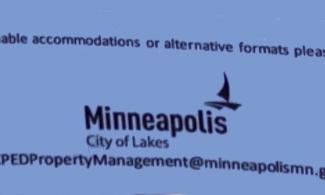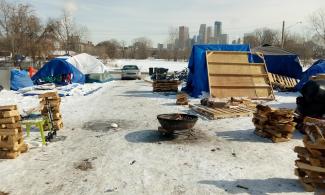Presented without comment for now, except that shelters are not a solution and it took massive pressure to get the city to talk to residents. To support the residents working to find more permanent housing please donate.
From: Topinka, Katie J <Katie.Topinka@minneapolismn.gov>
Sent: Thursday, February 25, 2021 8:16 AM
Subject: Encampment Update
Council President, Council Vice President and Council Members,
I know that several of your offices have received inquiries about the Near North encampment, so I am providing an update to all Council offices:
Yesterday, City leaders and outreach teams met with people staying at the encampment located near 2nd and Girard Avenues N. The meeting was in response to a direct request from those living at the encampment. The residents of the encampment are actively working to find more permanent housing and they requested more time to complete this process. As a result of this conversation we will not close the encampment as planned this Friday. We want to support the residents’ effort and think it reasonable to provide them more time to secure housing or shelter, especially considering that Avivo Village shelter will expand occupancy to 100 people in early March. We have asked outreach teams to continue to engage with the residents of the encampment. We do not have a firm timeline or determination of a specific closure date, although we will have to close it at some point in the near future because the contaminated soil conditions may harm people with prolonged exposure.
The City’s goal is for everyone to be stably housed. We spend significant resources on affordable housing each year, and last year joined our partners to invest $55 million in homelessness response to expand emergency shelter, low-barrier housing and protective housing for people experiencing homelessness, as well as enhance existing shelters and expand support services, rapid rehousing, and street outreach. The City’s share of these investments was $13.4 million. These partnerships, in combination with a new City emergency shelter ordinance adopted in December, and extensive technical assistance provided by City staff, resulted in four new emergency shelters that opened in late 2020, and another 36-bed facility starting construction. One of the facilities – Avivo Village – opened initially at the end of December and will be open to full capacity (100 units) in March.
We do not believe it is safe for anyone to stay outdoors and encourage all of our unsheltered neighbors to engage with outreach providers and find shelter whenever possible. Hennepin County, along with nonprofit shelter providers, have taken tremendous measures to ensure that the shelter system remains safe during the pandemic. Shelter beds remain available and can be reserved by calling Adult Shelter Connect at 612-248-2350.
Thank you and please contact me with any questions.
Katie Topinka
Housing Policy Coordinator
Pronouns: she/her/hersCity of Minneapolis – Community Planning and Economic Development
505 4th Ave S #320
Minneapolis, MN 55415Office: 612-673-5068
Cell: 612-364-4657
katie.topinka@minneapolismn.gov
www.minneapolismn.gov/cped



Comments
mlncn
Mon, 03/01/2021 - 14:15
Lightly edited, here is the main content of one e-mail to a city council member's office seeking to follow up on the letter from the housing policy coordinator on Near North camp: